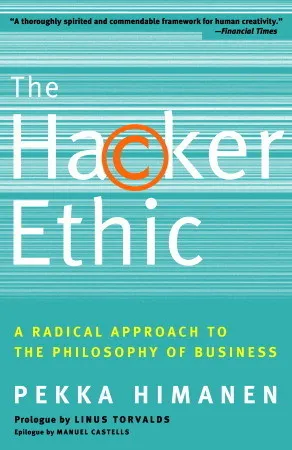The Hacker Ethic: A Radical Approach to the Philosophy of Business

Unveiling "The Hacker Ethic": A Philosophical Journey with Torvalds and Himanen
A Radical Approach to Business Philosophy
The Intriguing Duo
"The Hacker Ethic: A Radical Approach to the Philosophy of Business" by Linus Torvalds and Pekka Himanen isn't your typical business philosophy book. It's a collaboration between a computer programmer legend and a philosopher, offering a unique lens through which to view the intersection of technology, work, and life.
Personal Tech Odyssey
Before we dive into the philosophical depths of "The Hacker Ethic," let me share a personal tech odyssey. Growing up in the digital age, I witnessed the transformative power of technology. It wasn't just about gadgets; it was about the culture, the ethos of hacking, and the sense of possibility. "The Hacker Ethic" felt like a chance to explore the roots of this tech culture.
Hacking Beyond Computers
Redefining Hacking
The term "hacker" often conjures images of clandestine figures breaking into computer systems. However, Torvalds and Himanen aim to redefine hacking. It's not just about computers; it's a mindset, a way of approaching challenges with a creative and open spirit.
Personal Anecdote: My Hacking Mindset
As I delved into the book, I couldn't help but reflect on my own "hacking" mindset. It wasn't about breaching firewalls but about finding innovative solutions to everyday problems. Torvalds and Himanen's perspective validated the idea that hacking is more than a technical skill—it's a philosophy applicable to various aspects of life.
The Three Virtues of the Hacker
Passion, Freedom, and Social Benefit
At the core of the hacker ethic are three virtues: passion, freedom, and social benefit. Hackers, as defined by Torvalds and Himanen, are driven by a deep passion for what they do, a desire for freedom to explore and create, and a commitment to contributing to the greater good.
Personal Reflection: The Virtues in Action
As I reflected on these virtues, I found instances in my own life where the hacker ethic was at play. Pursuing a passion project, valuing freedom in my work, and seeking ways to contribute to my community—all resonated with the virtues outlined in the book.
Technology as a Tool for Empowerment
Democratizing Technology
"The Hacker Ethic" celebrates the democratization of technology. It's not about technology being controlled by a select few; it's about empowering individuals to understand, modify, and create with technology.
Personal Empowerment through Tech
The book prompted me to consider how technology had empowered me personally. From learning to code and building websites to using digital tools to express creativity, technology became a tool for personal empowerment, aligning with the hacker ethic.
A Holistic View of Work
Breaking Work Stereotypes
Torvalds and Himanen challenge traditional notions of work. Hacking, in their view, is a form of play—a passionate engagement with tasks that transcends the typical work/play dichotomy.
Personal Anecdote: Hacking Playfully
I recalled moments where I approached work with a playful, hacking mindset. Those were the instances when creativity flowed, problem-solving felt like a puzzle, and the boundaries between work and play blurred. The book affirmed the validity of this approach.
The Open Source Philosophy
Collaborative Creation
Central to the hacker ethic is the concept of open source. It's about collaborative creation, sharing knowledge, and building upon the work of others. The success of Linux, an open-source operating system, serves as a prime example.
Personal Connection to Collaboration
The emphasis on collaboration resonated deeply. I thought about projects where collective efforts produced something greater than individual contributions. The open source philosophy wasn't confined to coding; it was a mindset applicable to diverse fields.
Conclusion: Embracing the Hacker Ethic
A Call to Embrace Creativity
In conclusion, "The Hacker Ethic" extends a call to embrace creativity, passion, and the power of collaborative creation. Torvalds and Himanen's radical approach challenges preconceived notions about work, technology, and the possibilities that emerge when we adopt a hacker mindset.
So, if you're ready to embark on a philosophical journey that transcends the binary world of computers, "The Hacker Ethic" beckons.